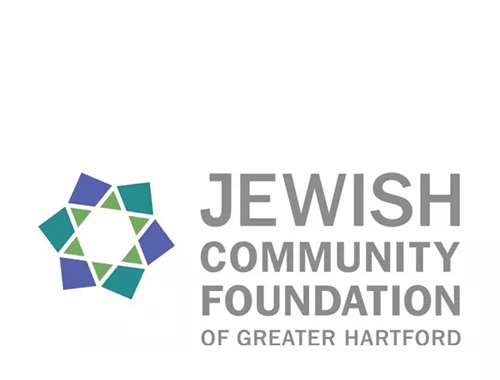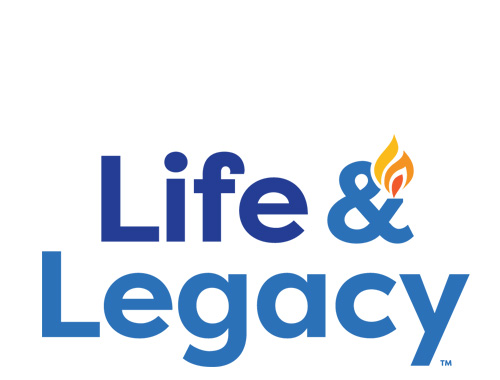Schechter Shavua: January 19, 2024
How Does “Kindness Yoga” Connect to Dr. Martin Luther King, Jr.?
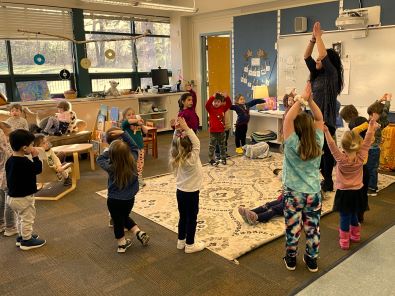 Schechter students spent Monday learning about and discussing the important messages of Dr. Martin Luther King, Jr. in a variety of age-appropriate ways. Younger students read stories about King's messages and completed related art projects. After the Shorashimstudents’ (EC 3-4) discussion about MLK, they talked about the ways in which people may be different, yet are connected in so many ways. Shorashim teacher Sarah Kruger led students in Kindness Yoga to help them feel those connections. Through their yoga practice, they sent kindness to themselves in Mountain pose, to others in Warrior 2 pose, and to the environment and nature in Tree pose.
Schechter students spent Monday learning about and discussing the important messages of Dr. Martin Luther King, Jr. in a variety of age-appropriate ways. Younger students read stories about King's messages and completed related art projects. After the Shorashimstudents’ (EC 3-4) discussion about MLK, they talked about the ways in which people may be different, yet are connected in so many ways. Shorashim teacher Sarah Kruger led students in Kindness Yoga to help them feel those connections. Through their yoga practice, they sent kindness to themselves in Mountain pose, to others in Warrior 2 pose, and to the environment and nature in Tree pose.
Meanwhile, elementary students reflected on their own dreams for creating a better world, and Schechter's oldest students held discussions about the state of Civil Rights in our country. These discussions about King's legacy continued throughout the week and they impact the Core Values like Lev Tov (Good Heart) that Schechter holds dear.
For photos of this and other MLK Day photos, click HERE
Israeli Families Help Students Learn about Types of Community
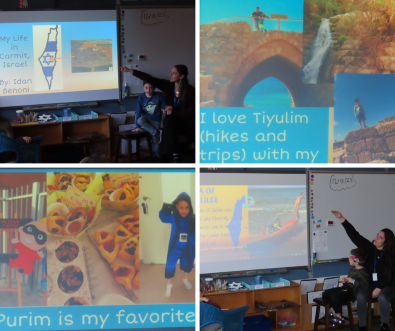 As the Anafim students (gr. 1-2) learn about Geography in Social Studies, they have gained valuable first-hand information about specific communities in Israel, thanks to our visiting Israeli families. Earlier in the year, the class began the unit with lessons focused on the different types of communities, like urban, suburban, and rural. In December, some of our Israeli families created presentations to help students learn about their own communities in Israel. These presentations both helped the students relate their broader learning to real communities and also engaged the Israeli students from the class.
As the Anafim students (gr. 1-2) learn about Geography in Social Studies, they have gained valuable first-hand information about specific communities in Israel, thanks to our visiting Israeli families. Earlier in the year, the class began the unit with lessons focused on the different types of communities, like urban, suburban, and rural. In December, some of our Israeli families created presentations to help students learn about their own communities in Israel. These presentations both helped the students relate their broader learning to real communities and also engaged the Israeli students from the class.
The Peretz family, from Herzliya, described their city as suburban/urban; they are located just north of Tel Aviv and have some tall buildings, but also many individual homes and apartments. The Benonifamily is from Carmit, outside of Be'er Sheva. They described their city as rural/suburban because their community is spread out and has more open space between the homes and within the community.
Todah rabah to both of these families for helping students build bridges of understanding from their Social Studies unit to the beloved communities of their Israeli friends. It was a great way for students to celebrate K’lal Yisrael (Unity of the Jewish People) and Kehillah(community).
Students Add New Prayer to Rosh Hodesh Service
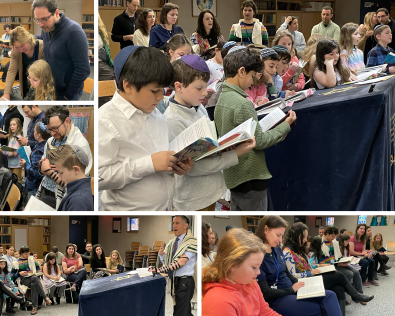 Last week, the Alim students (grades 3-4) helped lead a special Rosh Hodesh Tefillah program. In addition to a beautiful Shaharit service, students led Hallel, which they learned with Rabbi Berger and Rabbi Chatinover, and the ya'aleh veyavo paragraph, which they have been learning with Rabbi Chatinover. As they’ve been learning, students have had animated discussions in class about the meaning of ya'aleh veyavo . Rabbi Berger noted that each student is on their own individual journey of understanding and reciting these prayers; some might jump at the chance to lead, while others take time to feel comfortable. We are proud of the way that each student approaches their journey to prayer and the many ways that they incorporate Mitzvot (Jewish Practice) and Chochmah(Wisdom) into their learning
Last week, the Alim students (grades 3-4) helped lead a special Rosh Hodesh Tefillah program. In addition to a beautiful Shaharit service, students led Hallel, which they learned with Rabbi Berger and Rabbi Chatinover, and the ya'aleh veyavo paragraph, which they have been learning with Rabbi Chatinover. As they’ve been learning, students have had animated discussions in class about the meaning of ya'aleh veyavo . Rabbi Berger noted that each student is on their own individual journey of understanding and reciting these prayers; some might jump at the chance to lead, while others take time to feel comfortable. We are proud of the way that each student approaches their journey to prayer and the many ways that they incorporate Mitzvot (Jewish Practice) and Chochmah(Wisdom) into their learning
Fiction and Mpm-Fiction Help Students Practice Organized Writing
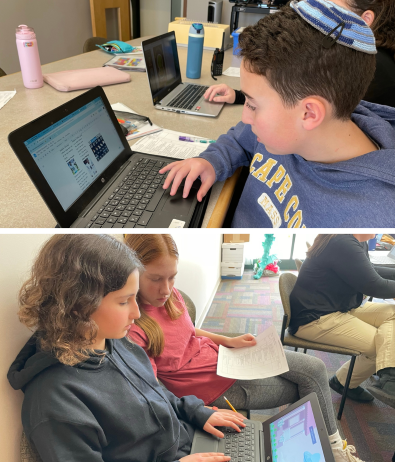 We’ve got budding authors strolling the Schechter hallways! Perahim and Amirim students (grades 7-8) recently chose topics to explore through either the genre of fiction or nonfiction writing. After reviewing the main components of both writing genres, students worked through the process of tackling their topics by brainstorming, outlining, drafting, revising, editing, and then publishing. They used graphic organizers and rubrics to help them stay focused, and were excited to share their completed picture books or short newspapers with their peers.
We’ve got budding authors strolling the Schechter hallways! Perahim and Amirim students (grades 7-8) recently chose topics to explore through either the genre of fiction or nonfiction writing. After reviewing the main components of both writing genres, students worked through the process of tackling their topics by brainstorming, outlining, drafting, revising, editing, and then publishing. They used graphic organizers and rubrics to help them stay focused, and were excited to share their completed picture books or short newspapers with their peers.
Schechter Scorpions Show Great Energy on the Hardwood!
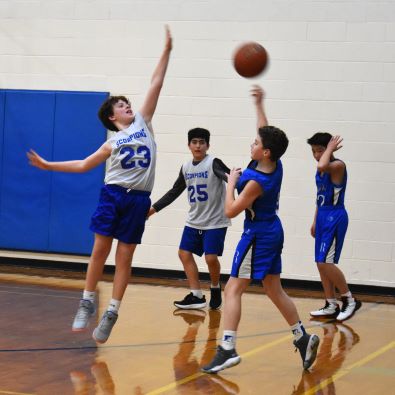
Check out photos from their recent JV and Varsity games at Renbrook HERE.
Parashat Bo—Feeling It All At Once
 “100 days of ______.” In January or February of any other year, if you ask an educator to fill in the blank, you will get one joyful answer: “100 days of school.” Younger grades often celebrate the 100th day of school in creative and exciting ways. Students may bring in 100 objects, or find creative ways to represent the number; they learn about place value, and celebrate how far they’ve come since the first day of school. This year, Schechter’s 100th day of school will be marked on February 5th, and our kindergarteners’ preparations are already underway.
“100 days of ______.” In January or February of any other year, if you ask an educator to fill in the blank, you will get one joyful answer: “100 days of school.” Younger grades often celebrate the 100th day of school in creative and exciting ways. Students may bring in 100 objects, or find creative ways to represent the number; they learn about place value, and celebrate how far they’ve come since the first day of school. This year, Schechter’s 100th day of school will be marked on February 5th, and our kindergarteners’ preparations are already underway.
But this year, all of us who are connected to Israel probably have an additional answer on our minds: “Captivity.” This past Sunday, January 14th marked 100 days of captivity for the remaining 130+ hostages who were violently seized from Israel on October 7 and have not yet returned home. Their plight represents our worst nightmares, and it’s normal to avoid thinking about nightmares, so there’s a part of us that seeks to avoid thinking about them—but we have to fight that inclination, and do things to keep them on our minds. We may wear a necklace or a bracelet, tape a number to our shirts, follow social media accounts that are dedicated to remembering the captives, or say extra prayers. We can do anything at all—except allow ourselves to forget.
The costs of Israel’s war in Gaza are rising, and the conflict shows no signs of coming to an end. Reasonable people—reasonable lovers of Israel—can disagree about the way the war has been waged, the choice of weapons that have been deployed, what the long-term solution should look like, or whether there is even hope for a long-term solution. All of us can agree on one thing: we cannot forget the hostages, and we cannot let their families feel forgotten.
The near-juxtaposition of these 100-day milestones highlights an emotionally demanding Jewish imperative: right now, we must strive to feel both gratitude and anguish every day. Our Torah insists on the importance of gratitude for the many blessings in our children’s lives, for our children’s learning and growth and friendships. So many mitzvot(elements of Jewish practice), especially Jewish prayer, are designed to help us feel grateful. We have a religious responsibility to appreciate our blessings. And at the same time, as Jews and as human beings, we need to remember the pain others are suffering, and feel it with them.
Our parashah is the perfect one for this moment. As it tells the story of the final stages of leaving Egypt, it includes the fundamental ingredients of the Pesach Seder, such as matzah and maror (bitter herbs), that are meant to help us immerse ourselves in both slavery and freedom. At the Seder, we say that in every generation, we are obligated to look at ourselves and imagine that we had left Egypt—in other words, as if we experienced both suffering and liberation. And in Maimonides’ version of the Haggadah, we are obligated to demonstratethat we left Egypt; we are supposed to publicly display both the bitter and the sweet. We are supposed to feel it all at once.
Being members of the Jewish community should not keep us from recognizing the suffering of the people of Gaza. At the same time, our first responsibility is to the innocent hostages, and to soldiers whose ultimate role is to protect the State of Israel. I would like to highlight two actions we can take to support the plight of the hostages, and Israel, at this crucial time:
- This Saturday night, at 6:30 p.m., JewishHartford Women (a new organization) has planned a community Havdalah and vigil on behalf of the hostages. It will take place in front of Young Israel of West Hartford. I hope you will bundle up and come! Please park on surrounding streets north of Albany: Seneca, Mohegan, Brewster, etc.
- Help feed Israelis in need, whether through Leket , a national food bank, or Mealuim, which sends meals to Israeli families who have a parent serving in the army.
One way of expressing the difference between the two, very different “100 Days” milestones is this: we want our days of joyful learning to increase and increase; we want the days of captivity to end as soon as possible. May God grant us both of these prayers.
Shabbat shalom,
Rabbi Jonathan Berger
Head of School
Questions for the Shabbat table:
- What are some things from this past week for which you feel especially grateful?
- When have you had to handle both joy/gratitude and sadness/grief at the same time?
- How can you keep aware of the plight of the hostages?
Solomon Schechter Day School
of Greater Hartford
26 Buena Vista Road
West Hartford, CT 06107
© Solomon Schechter Day School of Greater Hartford | Site design Knowles Kreative

